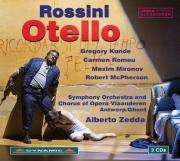|
Back
12/30/2015
Gioacchino Rossini: Otello
Gregory Kunde (Otello), Carmen Romeu (Desdemona), Maxim Mironov (Rodrigo), Robert McPherson (Iago), Josef Wagner (Emilio Barberigo), Raffaella Lupinacci (Emilia), Maarten Heirman (The Doge), Stephan Adriaens (A Gondolier), Symphony Orchestra and Chorus of Opera Vlaanderen Antwerp/Ghent, Alberto Zedda (Conductor), Jan Schweiger (Chorus master)
Recorded live at the Opera Theatre in Antwerp (February 14, 16 & 18, 2014) – 158’
Dynamic 3 CDs 7711/1-3 – Booklet in Italian and English (Distributed by Naxos of America)

   
This recording has many virtues but fails to reach absolute stellar quality. Conductor Alberto Zedda, age 86 at the time of the recording, is a renowned authority on Rossini and one of the architects of the now firmly-established Rossini revival, thus the essential style of the work is just right. Recording a live performance can give rise to sound problems but in this case things are fine.
Anyone discovering this work is surely aware of Verdi’s Otello and one simply must try to avoid making comparisons. Rossini composed the work in 1816 when he was 24; it was the last of four operas he debuted that year; the others were all comedies, including Il barbiere di Siviglia. Rossinian jauntiness seems incongruous when compared to Verdian weight, yet the work has a tight structure that, in the end, has its own validity as a treatment of the tragedy derived from Shakespeare’s play via a French treatment translated, with further changes, into Italian by Francesco Maria Berio.
The libretto differs from the original play in many ways. For one thing, there is no handkerchief. Otello and Desdemona have married in secret while her father has other plans. Iago inflames Otello’s jealousy by showing him a love letter written by Desdemona; it was meant for Otello, but Iago convinces him that it was intended for Rodrigo. Rodrigo is a much bigger role in this version. He is the son of the Doge and is ardently in love with Desdemona. Her father, Elmiro, is a major figure in the drama, and he favours the Doge’s son while despising the upstart foreigner Otello. We find that Iago also once had his sights on her not because of love but to further his ambitions.
Just as at the end of Act I of Barbiere, when the confused characters vent their individual dismay in the famous ensemble, the first act of Otello has a similar finale; it is interesting to see how Rossini used the same device so effectively in both a comic and tragic opera.
There are five tenors in the cast (Otello, Rodrigo, Iago, the Doge, and a passing gondolier) which gives rise to the interesting problem of engaging contrasting singers. Gregory Kunde is an intriguing choice for the title role as the baritonal quality of his voice would seem to rule him out as a Rossinan tenor, but he soars upwards when required. He is very much the stalwart warrior at the work’s start. The bel canto dream tenor role is that of the lovelorn Rodrigo and Maxim Mironov is terrific here, although his fast vibrato won’t be to every taste. Unlike Verdi’s opera, this version does not give us insight into Iago’s dark soul. Robert McPherson is very effective in the lengthy scene were he convinces Otello of Desdemona’s unfaithfulness; the two voices intertwine in what comes across as a perverse seduction.
The Doge is a role much like Emperor Altoum in Turandot; Maarten Heirman is convincing. Stephen Adriaens is the gondolier who sings in the distance in Act III while Desdemona confides her sadness to Emilia. He sings famous lines from Dante, translated as “There is no greater sorrow than to recall past happiness in times of distress”. It’s a lovely little vignette that is dramatically apropos.
Carmen Romeu displays an expressive, glowing voice as Desdemona. She is somewhat hard-pressed in the downward runs in the final big scene with Otello, although sounding severely stressed at this point on the drama is entirely apt. One could wish for more contrast between her voice and that of Raffaella Lupinacci as Emilia.
The single lower voice in the work is the role of Elmiro Barberigo, Desdemona’s father. Bass-baritone Josef Wagner makes a fine impression.
There are several recordings of this once-rare work (in fact Opera Rara recorded it under David Parry in 1999 when it was still somewhat of a rarity – although the revised Rossini edition was first performed in Pesaro in 1988.) There is even a recording of the version with a happy ending that Rossini subsequently composed, bowing to a demand for something more cheerful. The production by the Flemish opera was shared with Zurich and there is a DVD/Blu-ray disc of the Zurich production with quite a starry cast: John Osborne as Otello, Cecilia Bartoli as Desdemona, and Javier Camarena as Rodrigo. It is a modern-dress production in which the directors (Moishe Leiser and Patrice Caurier) belabor certain plot points; for repeated listening, a CD is often preferable to a DVD.
Dynamic Website
Michael Johnson
|